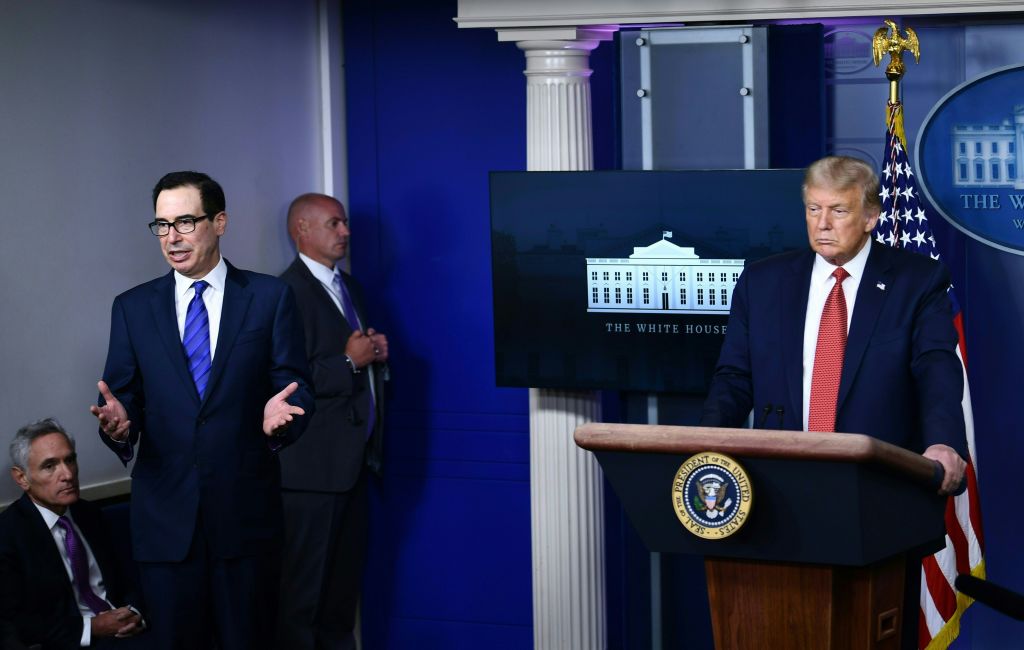Trump's executive action on unemployment aid would cost states billions, drain FEMA disaster fund


A free daily email with the biggest news stories of the day – and the best features from TheWeek.com
You are now subscribed
Your newsletter sign-up was successful
The executive order President Trump signed Sunday to unilaterally extend supplemental unemployment benefits doesn't appropriate any new funds — only Congress can do that — and requires states to cover 25 percent of the costs, a financial hit most cash-strapped states would struggle to absorb, even if they could overcome the technical hurdles of carrying out the scheme. The $44 billion Trump offered comes from FEMA's Disaster Relief Fund.
House Democrats passed a bill in May that would have extended $600 a week in federal unemployment benefits, plus giving aid to state and local governments, but Senate Republicans did not offer their own bill and those jobless benefits lapsed Aug. 1. Democratic leaders and White House negotiators hit a wall in negotiating a new package on Friday, and Trump announced his executive action Saturday, offering $400 a week — $100 of which legally has to come from states under the law he is using to sidestep Congress.
If every state applied to participate in Trump's new, legally questionable unemployment benefit scheme, the FEMA money would dry out in five or six weeks, after states updated their antiquated unemployment systems to meet the requirements of Trump's order, says Andrew Stettner, an unemployment aid expert at the Century Foundation. "No one's getting a payment from this in August. If they're lucky, they'll get it in September."
The Week
Escape your echo chamber. Get the facts behind the news, plus analysis from multiple perspectives.

Sign up for The Week's Free Newsletters
From our morning news briefing to a weekly Good News Newsletter, get the best of The Week delivered directly to your inbox.
From our morning news briefing to a weekly Good News Newsletter, get the best of The Week delivered directly to your inbox.
State officials from both parties said Monday they can't afford to pay the billions required when they are cutting their own workforce. Democratic governors were more vocal about their misgivings, but even Republicans who praised Trump for sidestepping Congress declined to say they would participate in his order. North Carolina officials questioned using FEMA disaster funds at the start of what's forecast to be a busy hurricane season. "States shouldn't be forced to choose which disaster victims to help," Dory MacMillan, press secretary Gov. Roy Cooper (D), told The Associated Press.
"I honestly think this can't possibly be serious," Michele Evermore at the liberal-leaning National Employment Law Project told Politico. "The White House must have released this thinking that this is just a negotiating tactic because it really is an empty promise."
A free daily email with the biggest news stories of the day – and the best features from TheWeek.com
Peter has worked as a news and culture writer and editor at The Week since the site's launch in 2008. He covers politics, world affairs, religion and cultural currents. His journalism career began as a copy editor at a financial newswire and has included editorial positions at The New York Times Magazine, Facts on File, and Oregon State University.
-
 The problem with diagnosing profound autism
The problem with diagnosing profound autismThe Explainer Experts are reconsidering the idea of autism as a spectrum, which could impact diagnoses and policy making for the condition
-
 What to know before filing your own taxes for the first time
What to know before filing your own taxes for the first timethe explainer Tackle this financial milestone with confidence
-
 The biggest box office flops of the 21st century
The biggest box office flops of the 21st centuryin depth Unnecessary remakes and turgid, expensive CGI-fests highlight this list of these most notorious box-office losers
-
 TikTok secures deal to remain in US
TikTok secures deal to remain in USSpeed Read ByteDance will form a US version of the popular video-sharing platform
-
 Unemployment rate ticks up amid fall job losses
Unemployment rate ticks up amid fall job lossesSpeed Read Data released by the Commerce Department indicates ‘one of the weakest American labor markets in years’
-
 US mints final penny after 232-year run
US mints final penny after 232-year runSpeed Read Production of the one-cent coin has ended
-
 Warner Bros. explores sale amid Paramount bids
Warner Bros. explores sale amid Paramount bidsSpeed Read The media giant, home to HBO and DC Studios, has received interest from multiple buying parties
-
 Gold tops $4K per ounce, signaling financial unease
Gold tops $4K per ounce, signaling financial uneaseSpeed Read Investors are worried about President Donald Trump’s trade war
-
 Electronic Arts to go private in record $55B deal
Electronic Arts to go private in record $55B dealspeed read The video game giant is behind ‘The Sims’ and ‘Madden NFL’
-
 New York court tosses Trump's $500M fraud fine
New York court tosses Trump's $500M fraud fineSpeed Read A divided appeals court threw out a hefty penalty against President Trump for fraudulently inflating his wealth
-
 Trump said to seek government stake in Intel
Trump said to seek government stake in IntelSpeed Read The president and Intel CEO Lip-Bu Tan reportedly discussed the proposal at a recent meeting
